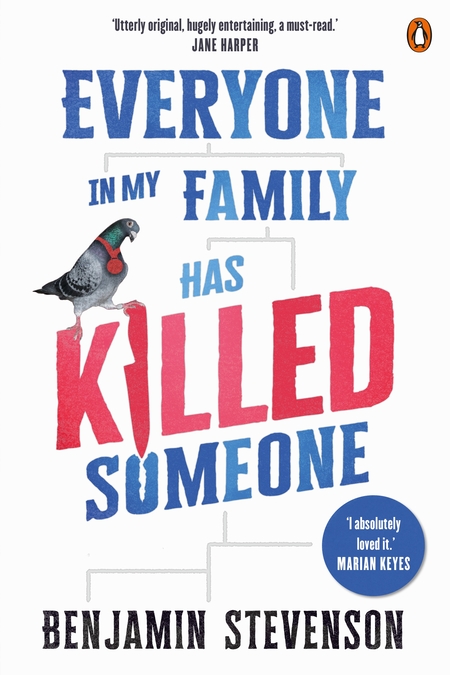(courtesy Penguin Books Australia)
Is it possible to improve on Agatha Christie, or indeed, any of the great mystery writing greats?
Many would say no, but then there’s a fair chance they haven’t read the brilliantly sleuthful concoction that is Everyone in My Family Has Killed Someone by Benjamin Stevenson, an inventive take on the classic whodunnit which is as much an exploration of family dynamics and how the past all too often deleteriously infects the present as it is a puzzle-solving exercise in the worst, and the perception-flawed best, of human nature.
Set, as these in-a-bottle stories must be, in a tightly confined environment, in this case a ski lodge in the middle of a snowstorm that traps the Cunningham family and associated in-laws for what is meant to be family reunion weekend, Everyone in My Family Has Killed Someone spins a tale that is so darkly, hilariously original, so self-aware of its mystery genre antecedents that it is able to simultaneously skilfully honour and subvert them, that you will be enthralled at how one-of-a-kind it is.
The closest you’ll likely arrive at in terms of going outside the genre paradigm and busting through that Miss Marple-sized envelope is anything by Stuart Turton (The Seven Deaths of Evelyn Hardcastle, The Devil and the Dark Water), and while Stevenson’s gem of a read might lack the supernatural element that’s made Turton’s reads wildly and cleverly original, it more than makes up for it with a keen eye on the many foibles of being human and how, despite our best efforts, we often put more feet wrong that we put right.
It was a silent agreement that Andy and I, who were standing at the corpse’s feet, would grab the ankles, and Sofia and the cop would take the wrists. We tried our best to keep him in the air, but as we shuffled down the hill in shin-deep snow, his head occasionally lolled back and gouged a valley in the fresh powder.
[The policeman] saw me looking at him. ‘You good, mate? Need a break?’
I shook my head. I didn’t say: I’m fine. I’ve done this before.
That, really, is the heart of Everyone in My Family Has Killed Someone.
While you could well argue that every mystery novel has at its heart an eye askance at how poorly humanity does at being even remotely human, there’s something about Stevenson’s novel that really grabs that idea and runs with it; well, until it hits the snow-filled carpark and realises there’s a body there, showing all the signs of murder most afoul, done in by an ancient Persian torture technique of all things which is showing up on the Aussie snowfields far too frequently for the likes of Ernest Cunningham, disgraced son of the clan (for reasons that make sense once you plunge into the novel), who ends up being, as he says, both Sherlock and Watson as the bodies start to pile up.
The problem he has is not so much that he’s not exactly loved and adored by his mother at the moment, nor that the Cunninghams generally have a massive PR problem with the police at the moment and a propensity to kill other people, but that he’s not exactly a detective.
Sure, he writes about how to pen mystery novels but that doesn’t make him a detective of any kind and so when his newly freed from jail brother Michael designates Ernest as his lawyer, he has to see just how much of the stuff he authors has actually sunk in.
(courtesy Penguin Books Australia (c) Monica Pronk)
The answer, rather happily for us as we consume this hyper self-aware novel which even goes so far as to flag on which pages the murders will occur, is quite a lot of it.
But knowing the theory is one thing, and executing on it is quite another, and much of what makes Everyone in My Family Has Killed Someone so compelling is how we see someone who hasn’t exactly excelled at life or family – to be fair, these failures have less to do with him that the twisted odd assortment of characters around him – really rise to the occasion.
He’s helped by the fact that he knows his brother, his estranged wife, his father, his mother, his stepfather, his aunt, his uncle, his stepsister, and sister-in-law quite well, and at the same time, hobbled by his lack of knowledge of hidden parts of family lore which, naturally enough, come out in ways obvious and not so obvious and which Ernest, or Ern, has to bundle together in a coherent line of thinking that, rather joyously ends up with a big reveal in guesthouse’s, yes you guessed it, library. (The fact that there’s a library involved is just one of the very clever ways Stevenson folds in traditional mystery genre elements to devastatingly smart and engrossingly involving effect.)
We weren’t really trapped by the storm, as happens so frequently in these types of novels. We weren’t trapped at all. But we were chained by our own egos, our regrets, our shame, and our stubbornness. It was time to swallow that. This is about the right time for an exodus anyway, I figure, being six chapters from the end.
This is fiendishly fun but very grounded Australian murder mystery fiction that knows that much of what fuels this branch of storytelling is a sage appreciation for how often people turn, deliberately or accidentally to violence, self-justifying rationalising very much intact thank you, in a bid to deal with some of life’s messy twists and turns.
It’s this eye on the contrariness of the human experience, and the uniquely strange way it finds expressions in families, that powers Everyone in My Family Has Killed Someone, a novel which is like therapy sessions sprung to life, that is, if those sessions were happy to kill someone in the service of a twisted goal.
Rather inspiringly, Everyone in My Family Has Killed Someone observes that “there are plenty of killers in the family … but only one murderer”, a recognition that much of the blood on people’s hands is less of the criminally murderous type and more of the self-inflicted wound variety.
These are people who want to be connected to each other and who needs that sense of belonging, no matter how warped it may be at times, but who are rather sh*t at making it happen or sustaining in a way that even hints of emotional healthiness.
It’s their need to be close and connected to each other, and to protect their weird familial bubble that gives Everyone in My Family Has Killed Someone so much of a blackly humourous glint and a brokenhearted thoughtfulness and which means that while there is indeed a fingering of a suspect at the end ) what else did you expect?), how it happens and the effect it has is wholly one-of-a-kind and meaningfully, emotionally impactful, proof it’s possible to honour a genre and gleefully dive in and around it, all the while taking a deep dive into the dark recesses of the human soul in the hope that something good, however tainted, might emerge.

